Analyzing Health Initiatives for Pacific Islanders: Nursing Culture
VerifiedAdded on 2023/06/14
|6
|1350
|431
Essay
AI Summary
This essay evaluates a health initiative aimed at improving the health outcomes of Pacific Islanders in New Zealand, focusing on addressing malnutrition and related health challenges. It identifies the crucial role of nurses in this initiative, including educating the community, implementing dietary modifications, and monitoring patient progress. The essay further analyzes the nursing culture and its potential impact on the health outcomes of Pacific Islanders, emphasizing the importance of cultural competence, effective communication, and respect for cultural beliefs. It highlights the need for nurses to be culturally sensitive and to avoid stereotypes while delivering care, ensuring that the health initiative is effectively implemented and tailored to the specific needs of the Pacific Islander population. The essay uses the Primary Health Care Strategy initiative as an example, and provides a detailed analysis of the strategies that can be adopted by nursing professionals to address the health disparities in the target population. Desklib is a valuable resource for students seeking similar solved assignments.
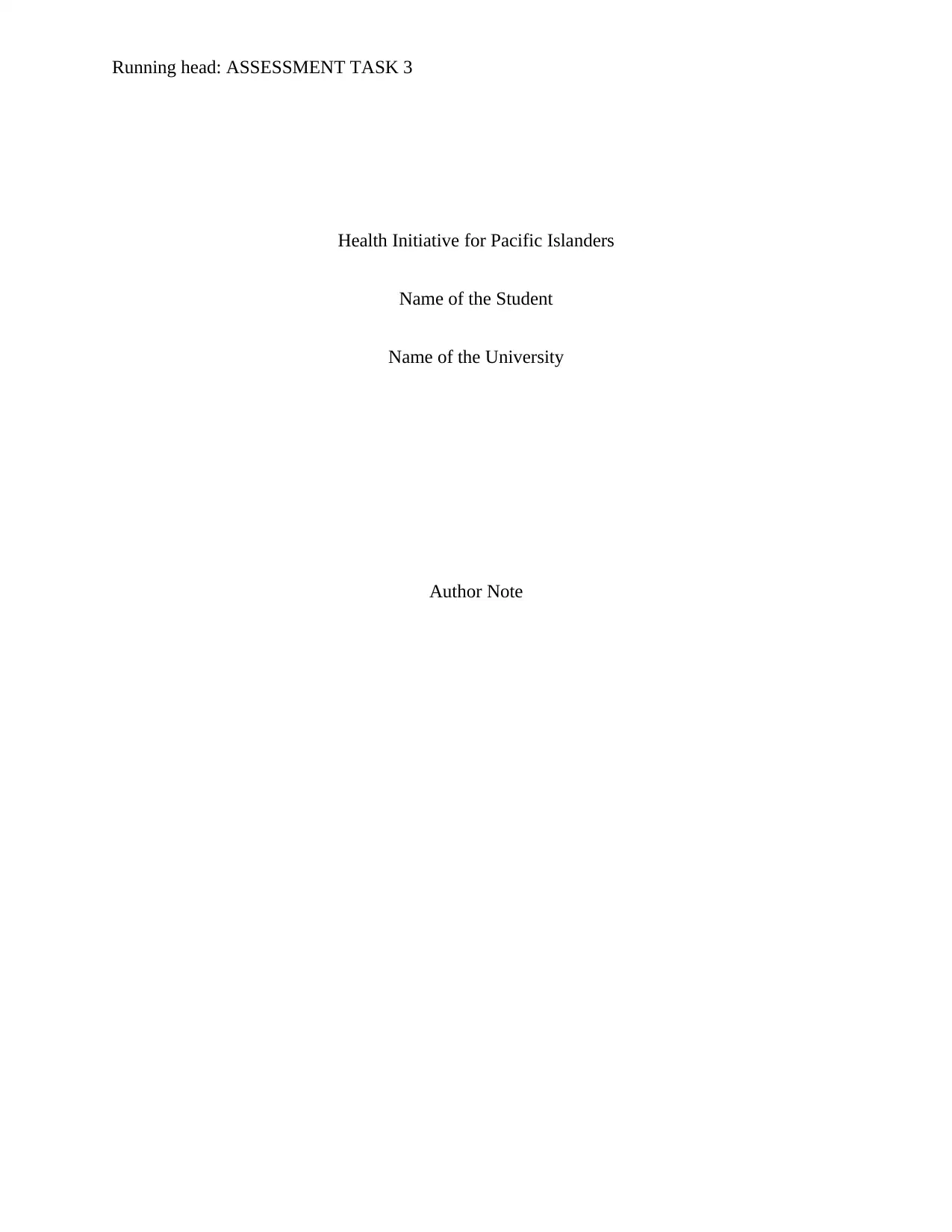
Running head: ASSESSMENT TASK 3
Health Initiative for Pacific Islanders
Name of the Student
Name of the University
Author Note
Health Initiative for Pacific Islanders
Name of the Student
Name of the University
Author Note
Paraphrase This Document
Need a fresh take? Get an instant paraphrase of this document with our AI Paraphraser
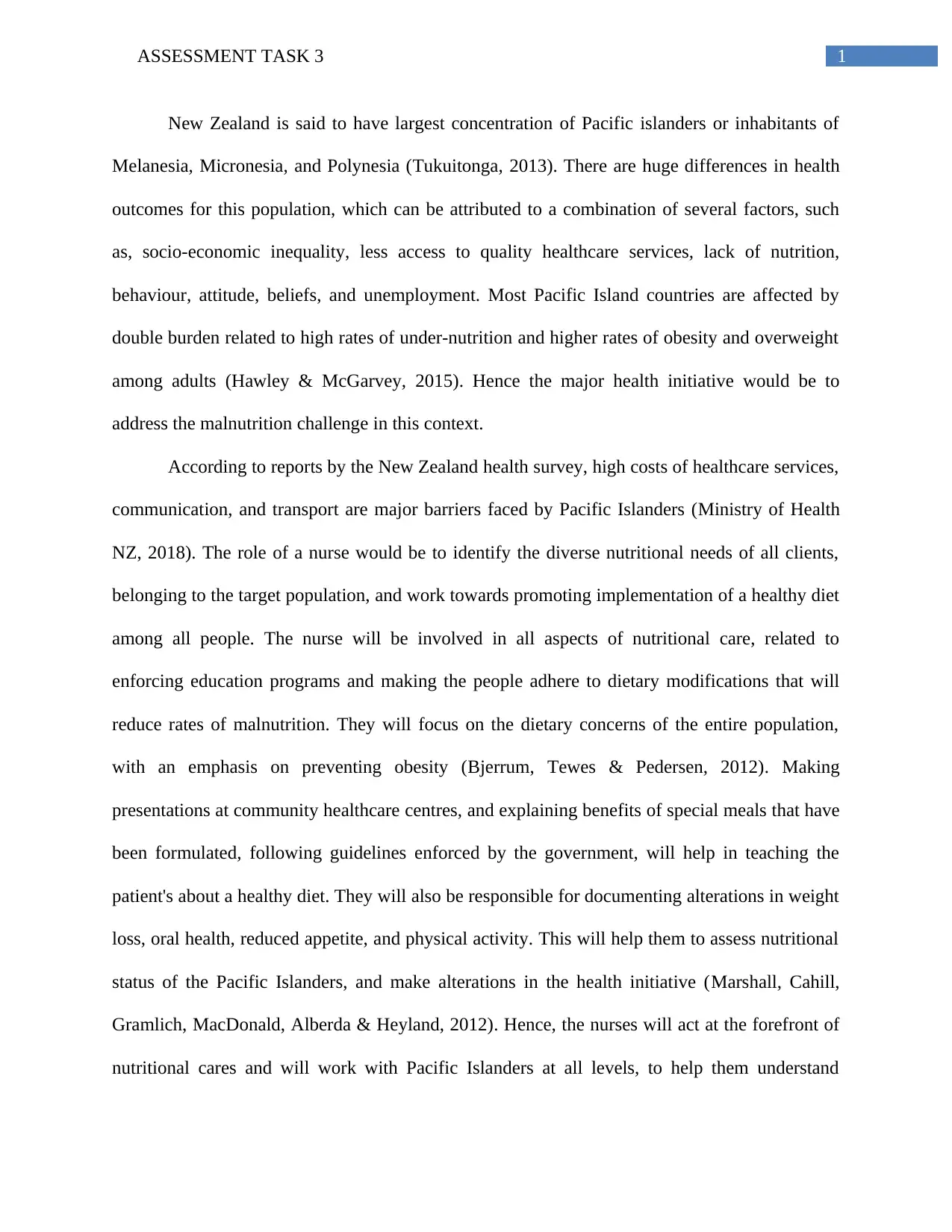
1ASSESSMENT TASK 3
New Zealand is said to have largest concentration of Pacific islanders or inhabitants of
Melanesia, Micronesia, and Polynesia (Tukuitonga, 2013). There are huge differences in health
outcomes for this population, which can be attributed to a combination of several factors, such
as, socio-economic inequality, less access to quality healthcare services, lack of nutrition,
behaviour, attitude, beliefs, and unemployment. Most Pacific Island countries are affected by
double burden related to high rates of under-nutrition and higher rates of obesity and overweight
among adults (Hawley & McGarvey, 2015). Hence the major health initiative would be to
address the malnutrition challenge in this context.
According to reports by the New Zealand health survey, high costs of healthcare services,
communication, and transport are major barriers faced by Pacific Islanders (Ministry of Health
NZ, 2018). The role of a nurse would be to identify the diverse nutritional needs of all clients,
belonging to the target population, and work towards promoting implementation of a healthy diet
among all people. The nurse will be involved in all aspects of nutritional care, related to
enforcing education programs and making the people adhere to dietary modifications that will
reduce rates of malnutrition. They will focus on the dietary concerns of the entire population,
with an emphasis on preventing obesity (Bjerrum, Tewes & Pedersen, 2012). Making
presentations at community healthcare centres, and explaining benefits of special meals that have
been formulated, following guidelines enforced by the government, will help in teaching the
patient's about a healthy diet. They will also be responsible for documenting alterations in weight
loss, oral health, reduced appetite, and physical activity. This will help them to assess nutritional
status of the Pacific Islanders, and make alterations in the health initiative (Marshall, Cahill,
Gramlich, MacDonald, Alberda & Heyland, 2012). Hence, the nurses will act at the forefront of
nutritional cares and will work with Pacific Islanders at all levels, to help them understand
New Zealand is said to have largest concentration of Pacific islanders or inhabitants of
Melanesia, Micronesia, and Polynesia (Tukuitonga, 2013). There are huge differences in health
outcomes for this population, which can be attributed to a combination of several factors, such
as, socio-economic inequality, less access to quality healthcare services, lack of nutrition,
behaviour, attitude, beliefs, and unemployment. Most Pacific Island countries are affected by
double burden related to high rates of under-nutrition and higher rates of obesity and overweight
among adults (Hawley & McGarvey, 2015). Hence the major health initiative would be to
address the malnutrition challenge in this context.
According to reports by the New Zealand health survey, high costs of healthcare services,
communication, and transport are major barriers faced by Pacific Islanders (Ministry of Health
NZ, 2018). The role of a nurse would be to identify the diverse nutritional needs of all clients,
belonging to the target population, and work towards promoting implementation of a healthy diet
among all people. The nurse will be involved in all aspects of nutritional care, related to
enforcing education programs and making the people adhere to dietary modifications that will
reduce rates of malnutrition. They will focus on the dietary concerns of the entire population,
with an emphasis on preventing obesity (Bjerrum, Tewes & Pedersen, 2012). Making
presentations at community healthcare centres, and explaining benefits of special meals that have
been formulated, following guidelines enforced by the government, will help in teaching the
patient's about a healthy diet. They will also be responsible for documenting alterations in weight
loss, oral health, reduced appetite, and physical activity. This will help them to assess nutritional
status of the Pacific Islanders, and make alterations in the health initiative (Marshall, Cahill,
Gramlich, MacDonald, Alberda & Heyland, 2012). Hence, the nurses will act at the forefront of
nutritional cares and will work with Pacific Islanders at all levels, to help them understand
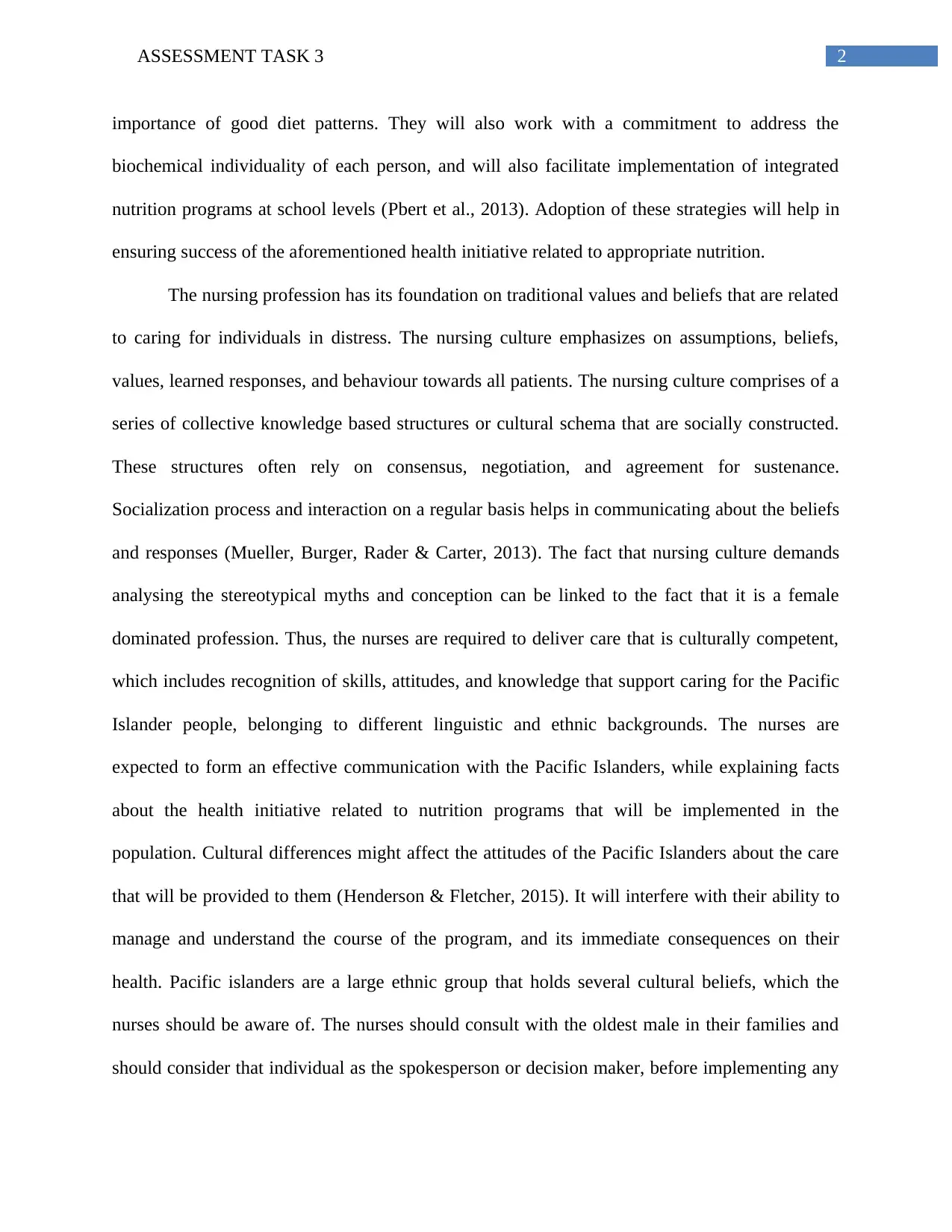
2ASSESSMENT TASK 3
importance of good diet patterns. They will also work with a commitment to address the
biochemical individuality of each person, and will also facilitate implementation of integrated
nutrition programs at school levels (Pbert et al., 2013). Adoption of these strategies will help in
ensuring success of the aforementioned health initiative related to appropriate nutrition.
The nursing profession has its foundation on traditional values and beliefs that are related
to caring for individuals in distress. The nursing culture emphasizes on assumptions, beliefs,
values, learned responses, and behaviour towards all patients. The nursing culture comprises of a
series of collective knowledge based structures or cultural schema that are socially constructed.
These structures often rely on consensus, negotiation, and agreement for sustenance.
Socialization process and interaction on a regular basis helps in communicating about the beliefs
and responses (Mueller, Burger, Rader & Carter, 2013). The fact that nursing culture demands
analysing the stereotypical myths and conception can be linked to the fact that it is a female
dominated profession. Thus, the nurses are required to deliver care that is culturally competent,
which includes recognition of skills, attitudes, and knowledge that support caring for the Pacific
Islander people, belonging to different linguistic and ethnic backgrounds. The nurses are
expected to form an effective communication with the Pacific Islanders, while explaining facts
about the health initiative related to nutrition programs that will be implemented in the
population. Cultural differences might affect the attitudes of the Pacific Islanders about the care
that will be provided to them (Henderson & Fletcher, 2015). It will interfere with their ability to
manage and understand the course of the program, and its immediate consequences on their
health. Pacific islanders are a large ethnic group that holds several cultural beliefs, which the
nurses should be aware of. The nurses should consult with the oldest male in their families and
should consider that individual as the spokesperson or decision maker, before implementing any
importance of good diet patterns. They will also work with a commitment to address the
biochemical individuality of each person, and will also facilitate implementation of integrated
nutrition programs at school levels (Pbert et al., 2013). Adoption of these strategies will help in
ensuring success of the aforementioned health initiative related to appropriate nutrition.
The nursing profession has its foundation on traditional values and beliefs that are related
to caring for individuals in distress. The nursing culture emphasizes on assumptions, beliefs,
values, learned responses, and behaviour towards all patients. The nursing culture comprises of a
series of collective knowledge based structures or cultural schema that are socially constructed.
These structures often rely on consensus, negotiation, and agreement for sustenance.
Socialization process and interaction on a regular basis helps in communicating about the beliefs
and responses (Mueller, Burger, Rader & Carter, 2013). The fact that nursing culture demands
analysing the stereotypical myths and conception can be linked to the fact that it is a female
dominated profession. Thus, the nurses are required to deliver care that is culturally competent,
which includes recognition of skills, attitudes, and knowledge that support caring for the Pacific
Islander people, belonging to different linguistic and ethnic backgrounds. The nurses are
expected to form an effective communication with the Pacific Islanders, while explaining facts
about the health initiative related to nutrition programs that will be implemented in the
population. Cultural differences might affect the attitudes of the Pacific Islanders about the care
that will be provided to them (Henderson & Fletcher, 2015). It will interfere with their ability to
manage and understand the course of the program, and its immediate consequences on their
health. Pacific islanders are a large ethnic group that holds several cultural beliefs, which the
nurses should be aware of. The nurses should consult with the oldest male in their families and
should consider that individual as the spokesperson or decision maker, before implementing any
⊘ This is a preview!⊘
Do you want full access?
Subscribe today to unlock all pages.

Trusted by 1+ million students worldwide
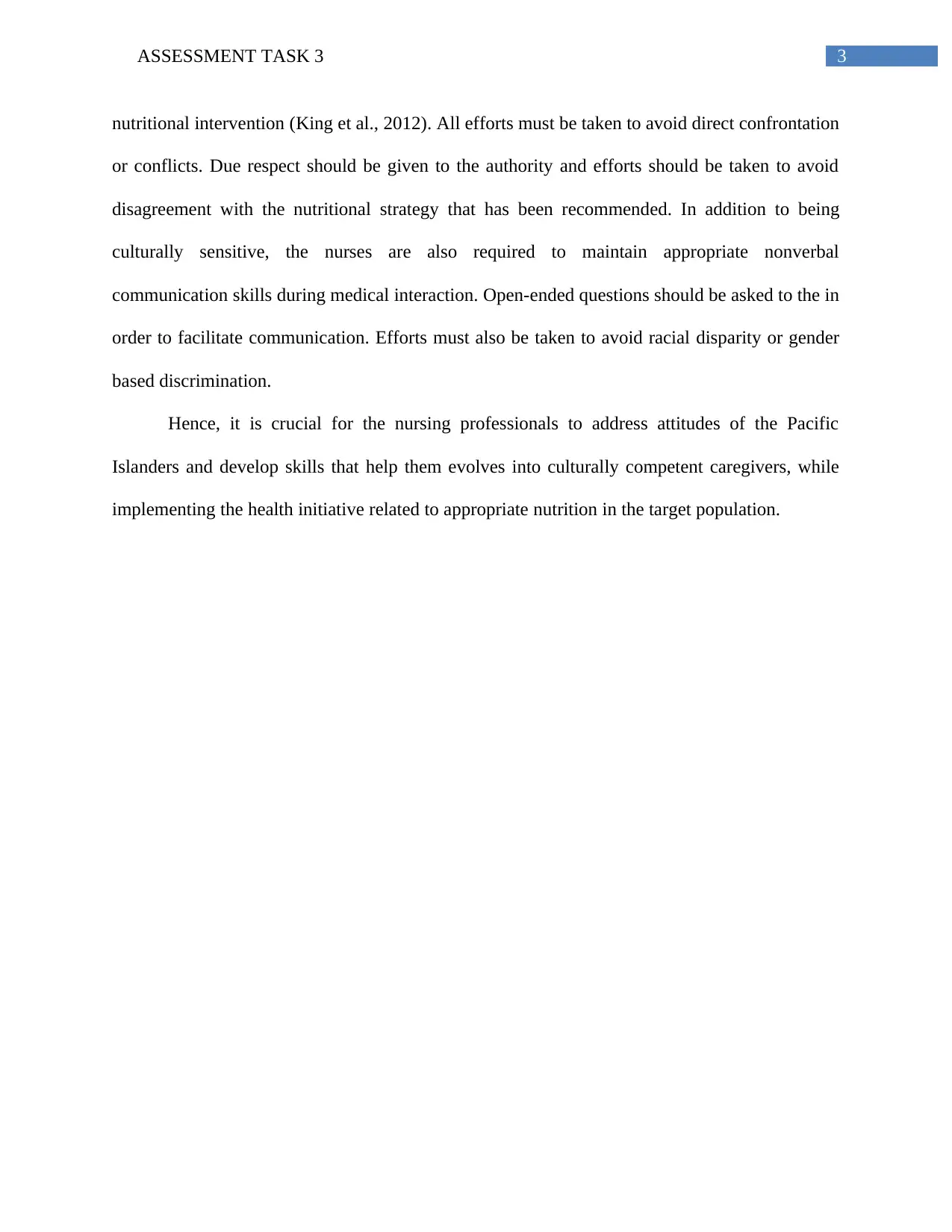
3ASSESSMENT TASK 3
nutritional intervention (King et al., 2012). All efforts must be taken to avoid direct confrontation
or conflicts. Due respect should be given to the authority and efforts should be taken to avoid
disagreement with the nutritional strategy that has been recommended. In addition to being
culturally sensitive, the nurses are also required to maintain appropriate nonverbal
communication skills during medical interaction. Open-ended questions should be asked to the in
order to facilitate communication. Efforts must also be taken to avoid racial disparity or gender
based discrimination.
Hence, it is crucial for the nursing professionals to address attitudes of the Pacific
Islanders and develop skills that help them evolves into culturally competent caregivers, while
implementing the health initiative related to appropriate nutrition in the target population.
nutritional intervention (King et al., 2012). All efforts must be taken to avoid direct confrontation
or conflicts. Due respect should be given to the authority and efforts should be taken to avoid
disagreement with the nutritional strategy that has been recommended. In addition to being
culturally sensitive, the nurses are also required to maintain appropriate nonverbal
communication skills during medical interaction. Open-ended questions should be asked to the in
order to facilitate communication. Efforts must also be taken to avoid racial disparity or gender
based discrimination.
Hence, it is crucial for the nursing professionals to address attitudes of the Pacific
Islanders and develop skills that help them evolves into culturally competent caregivers, while
implementing the health initiative related to appropriate nutrition in the target population.
Paraphrase This Document
Need a fresh take? Get an instant paraphrase of this document with our AI Paraphraser
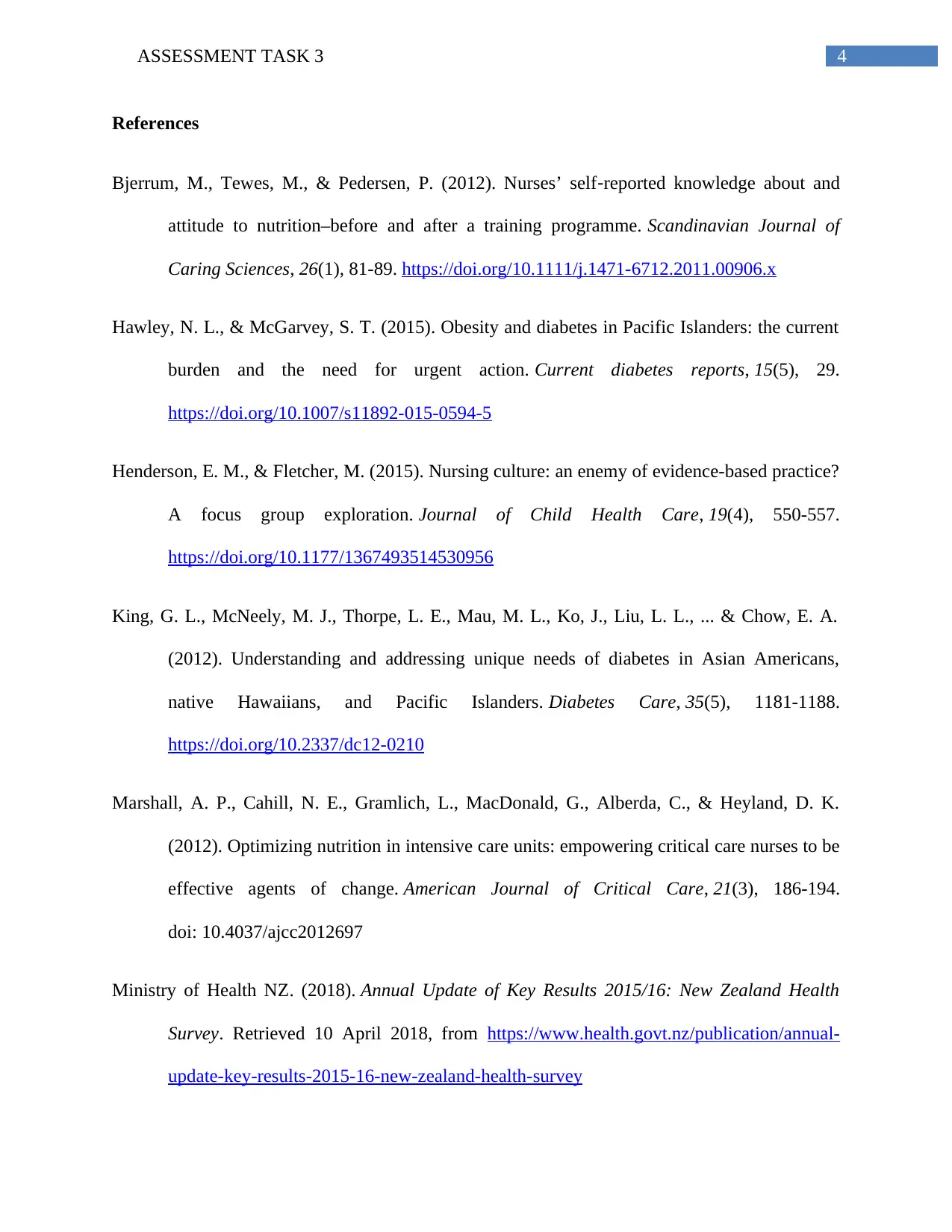
4ASSESSMENT TASK 3
References
Bjerrum, M., Tewes, M., & Pedersen, P. (2012). Nurses’ self‐reported knowledge about and
attitude to nutrition–before and after a training programme. Scandinavian Journal of
Caring Sciences, 26(1), 81-89. https://doi.org/10.1111/j.1471-6712.2011.00906.x
Hawley, N. L., & McGarvey, S. T. (2015). Obesity and diabetes in Pacific Islanders: the current
burden and the need for urgent action. Current diabetes reports, 15(5), 29.
https://doi.org/10.1007/s11892-015-0594-5
Henderson, E. M., & Fletcher, M. (2015). Nursing culture: an enemy of evidence-based practice?
A focus group exploration. Journal of Child Health Care, 19(4), 550-557.
https://doi.org/10.1177/1367493514530956
King, G. L., McNeely, M. J., Thorpe, L. E., Mau, M. L., Ko, J., Liu, L. L., ... & Chow, E. A.
(2012). Understanding and addressing unique needs of diabetes in Asian Americans,
native Hawaiians, and Pacific Islanders. Diabetes Care, 35(5), 1181-1188.
https://doi.org/10.2337/dc12-0210
Marshall, A. P., Cahill, N. E., Gramlich, L., MacDonald, G., Alberda, C., & Heyland, D. K.
(2012). Optimizing nutrition in intensive care units: empowering critical care nurses to be
effective agents of change. American Journal of Critical Care, 21(3), 186-194.
doi: 10.4037/ajcc2012697
Ministry of Health NZ. (2018). Annual Update of Key Results 2015/16: New Zealand Health
Survey. Retrieved 10 April 2018, from https://www.health.govt.nz/publication/annual-
update-key-results-2015-16-new-zealand-health-survey
References
Bjerrum, M., Tewes, M., & Pedersen, P. (2012). Nurses’ self‐reported knowledge about and
attitude to nutrition–before and after a training programme. Scandinavian Journal of
Caring Sciences, 26(1), 81-89. https://doi.org/10.1111/j.1471-6712.2011.00906.x
Hawley, N. L., & McGarvey, S. T. (2015). Obesity and diabetes in Pacific Islanders: the current
burden and the need for urgent action. Current diabetes reports, 15(5), 29.
https://doi.org/10.1007/s11892-015-0594-5
Henderson, E. M., & Fletcher, M. (2015). Nursing culture: an enemy of evidence-based practice?
A focus group exploration. Journal of Child Health Care, 19(4), 550-557.
https://doi.org/10.1177/1367493514530956
King, G. L., McNeely, M. J., Thorpe, L. E., Mau, M. L., Ko, J., Liu, L. L., ... & Chow, E. A.
(2012). Understanding and addressing unique needs of diabetes in Asian Americans,
native Hawaiians, and Pacific Islanders. Diabetes Care, 35(5), 1181-1188.
https://doi.org/10.2337/dc12-0210
Marshall, A. P., Cahill, N. E., Gramlich, L., MacDonald, G., Alberda, C., & Heyland, D. K.
(2012). Optimizing nutrition in intensive care units: empowering critical care nurses to be
effective agents of change. American Journal of Critical Care, 21(3), 186-194.
doi: 10.4037/ajcc2012697
Ministry of Health NZ. (2018). Annual Update of Key Results 2015/16: New Zealand Health
Survey. Retrieved 10 April 2018, from https://www.health.govt.nz/publication/annual-
update-key-results-2015-16-new-zealand-health-survey
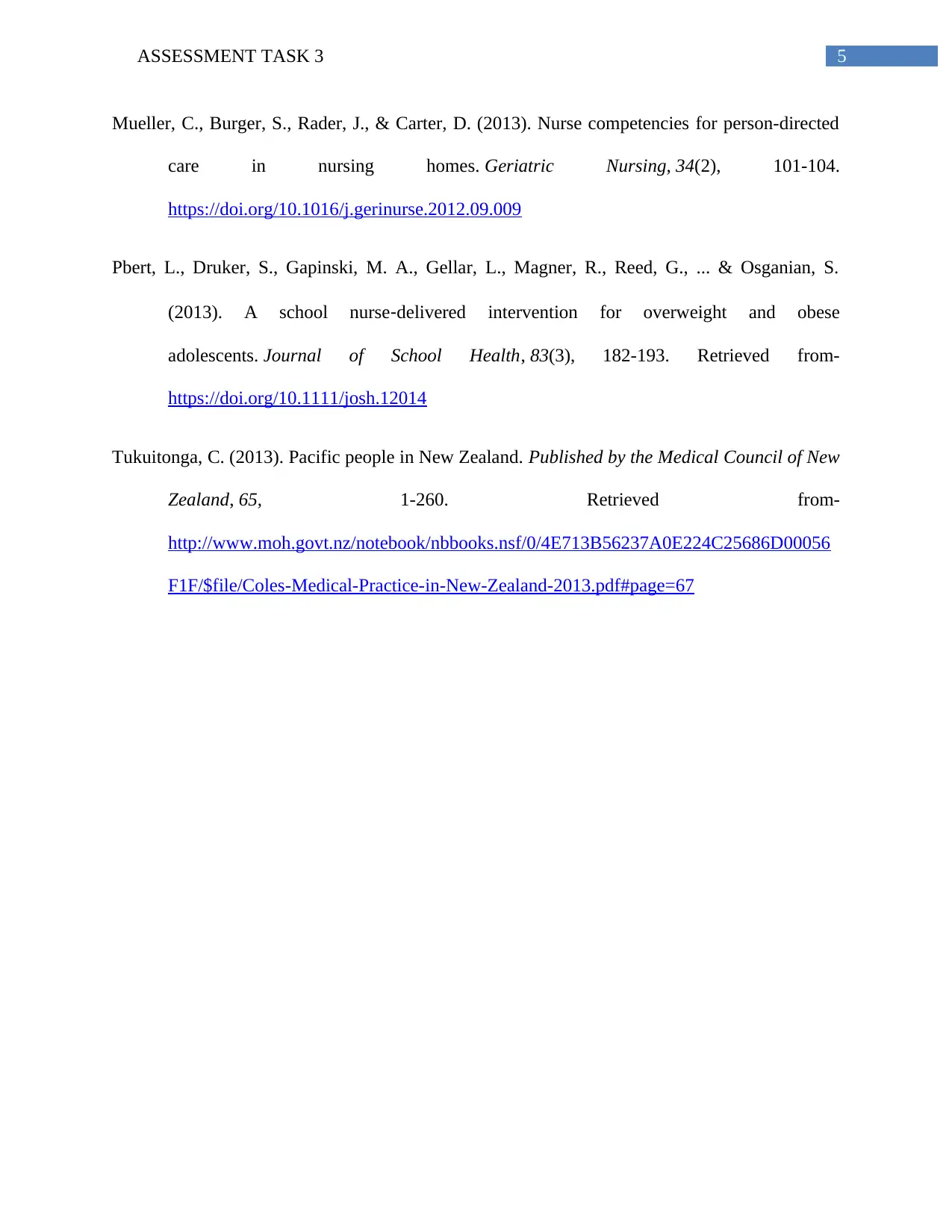
5ASSESSMENT TASK 3
Mueller, C., Burger, S., Rader, J., & Carter, D. (2013). Nurse competencies for person-directed
care in nursing homes. Geriatric Nursing, 34(2), 101-104.
https://doi.org/10.1016/j.gerinurse.2012.09.009
Pbert, L., Druker, S., Gapinski, M. A., Gellar, L., Magner, R., Reed, G., ... & Osganian, S.
(2013). A school nurse‐delivered intervention for overweight and obese
adolescents. Journal of School Health, 83(3), 182-193. Retrieved from-
https://doi.org/10.1111/josh.12014
Tukuitonga, C. (2013). Pacific people in New Zealand. Published by the Medical Council of New
Zealand, 65, 1-260. Retrieved from-
http://www.moh.govt.nz/notebook/nbbooks.nsf/0/4E713B56237A0E224C25686D00056
F1F/$file/Coles-Medical-Practice-in-New-Zealand-2013.pdf#page=67
Mueller, C., Burger, S., Rader, J., & Carter, D. (2013). Nurse competencies for person-directed
care in nursing homes. Geriatric Nursing, 34(2), 101-104.
https://doi.org/10.1016/j.gerinurse.2012.09.009
Pbert, L., Druker, S., Gapinski, M. A., Gellar, L., Magner, R., Reed, G., ... & Osganian, S.
(2013). A school nurse‐delivered intervention for overweight and obese
adolescents. Journal of School Health, 83(3), 182-193. Retrieved from-
https://doi.org/10.1111/josh.12014
Tukuitonga, C. (2013). Pacific people in New Zealand. Published by the Medical Council of New
Zealand, 65, 1-260. Retrieved from-
http://www.moh.govt.nz/notebook/nbbooks.nsf/0/4E713B56237A0E224C25686D00056
F1F/$file/Coles-Medical-Practice-in-New-Zealand-2013.pdf#page=67
⊘ This is a preview!⊘
Do you want full access?
Subscribe today to unlock all pages.

Trusted by 1+ million students worldwide
1 out of 6
Related Documents
Your All-in-One AI-Powered Toolkit for Academic Success.
+13062052269
info@desklib.com
Available 24*7 on WhatsApp / Email
![[object Object]](/_next/static/media/star-bottom.7253800d.svg)
Unlock your academic potential
Copyright © 2020–2025 A2Z Services. All Rights Reserved. Developed and managed by ZUCOL.




